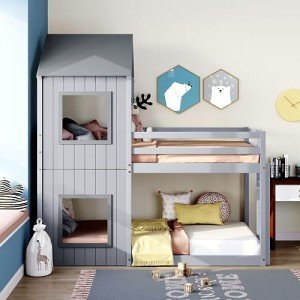10 Essentials Concerning Bunks You Didn't Learn In The Classroom
Bunks: The Versatile Space-Saving Solution for Modern Living
In today's hectic world, where metropolitan home are shrinking and the need for flexibility and functionality is increasing, bunks have actually emerged as a popular solution. Bunks are not simply a kind of bed; they represent a sophisticated technique to maximizing space, promoting social interaction, and offering comfy sleeping plans. This article will check out the different types of bunks available, their advantages, and how they can change both small and large living areas.
Understanding Bunks: What Are They?
Bunks, commonly described as bunk beds, are 2 or more beds stacked on top of each other. They are developed to save floor space, making them perfect for children's rooms, hostels, and even adult living scenarios. Bunk beds are available in various designs and configurations, from conventional designs to modern, designer analyses.
Kinds of Bunks
Kind of Bunk
Description
Twin-over-Twin
2 twin beds stacked on top of each other. Perfect for kids sharing a room.
Twin-over-Full
A twin bed on top and a bigger full bed on the bottom. Great for accommodating visitors.
Full-over-Full
Two full-sized beds stacked together. Perfect for older kids or adults.
L-Shaped Bunk Bed
Beds are organized in an L shape, enabling a corner placement and included space underneath.
Loft Beds
Only the leading bunk exists, leaving room for a desk, couch, or storage beneath.
Triple Bunk Beds
Three beds stacked vertically, outstanding for optimizing vertical space.
Benefits of Using Bunks
Space Efficiency: Bunks are developed to use vertical space, making them perfect for small bed rooms or homes where floor space is limited.
Cost-efficient: Investing in a bunk bed can be more economical than buying several separate beds, especially for growing families or those with frequent guests.
Versatile Designs: Many bunks come with add-ons, such as desks, storage drawers, or futons, enabling versatile usage of the location.
Social Interaction: Bunk beds welcome camaraderie amongst siblings and pals, promoting a sense of connection.
Innovative Use of Space: Bunk beds motivate imagination in space design, permitting for lively styles and colorful decor that can make a bed room feel special and welcoming.
Practical Considerations
Height Limitations: When choosing a bunk bed, it is important to consider the height of the ceiling in the space. Step the space to ensure there is appropriate clearance above the top bunk for security and convenience.
Weight Restrictions: Each bunk has a particular weight limitation. Moms and dads need to assess the weight of those utilizing it, especially when it comes to adults or heavier adolescents sharing the bed.
Security Features: Features such as guardrails, tough ladders, and safety accreditations are vital for making sure the bunk bed's security, particularly for more youthful users.
Bunks for Various Living Situations
Household Homes
In family homes, bunks provide a useful service for siblings sharing a space or accommodating sleepovers. Bunk beds can be stylishly incorporated into a kid's space while supplying ample room for play.
Hostels and Vacation Rentals
For hostels and vacation leasings, bunk beds take full advantage of sleeping plans without jeopardizing convenience. Such setups use a cost-effective method to accommodate a larger variety of guests.
College Dormitories
In college dormitories, bunks assist make the most of the minimal square footage available, permitting for more space to interact socially and study.
Studio apartments
In little city apartments, lofted bunk beds create extra space for living areas, offices, or storage, making life more manageable in compact environments.
Upkeep and Care of Bunks
Preserving a bunk bed is essential for ensuring its durability. Here are a couple of ideas:
Regular Inspections: Check for any loose screws or bolts and tighten them as required.
Cleanliness: Dust and clean the bunks regularly to prevent irritants and make sure a clean sleeping environment.
Bed mattress Care: Use a quality bed mattress protector to maintain hygiene and extend the life of the mattress.
Age Appropriateness: Upgrade to a bigger, more sturdy bunk as kids grow or when the present arrangement no longer meets the requirements of its residents.
Often Asked Questions (FAQs)
1. Are bunk beds safe for children?
Yes, bunk beds can be safe for kids if they are built with security functions like guardrails and a steady ladder. Always monitor more youthful children when they are using bunk beds.
2. What age is suitable for a child to sleep on the top bunk?
The majority of manufacturers recommend that kids under the age of 6 must not sleep on the upper bunk due to security concerns.
3. How much weight can bunk beds typically hold?
Weight capabilities vary based on the design and products but typically vary from 200 to 400 pounds. Always inspect the maker's guidelines.
4. Can bunk beds be separated into two single beds?
Many bunk beds are developed to be convertible, allowing them to be separated into two specific beds. It's essential to examine the item requirements before acquiring.
5. What type of bed mattress is best for a bunk bed?
A medium-firm mattress is often suggested as it supplies appropriate support without being too heavy or soft, which can posture safety issues.
Bunks are more than simply beds. Bunk Beds For Adults UK are ingenious space-saving solutions that cater to the needs of modern-day living. With different styles offered, they offer comfort and functionality for families, visitors, and people alike. By focusing on security and maintenance, owners can make sure that their bunk beds end up being a valued part of their living spaces for several years to come. Whether for spirited children or accommodating visitors, bunk beds provide an elegant and practical option to the challenge of limited space.
